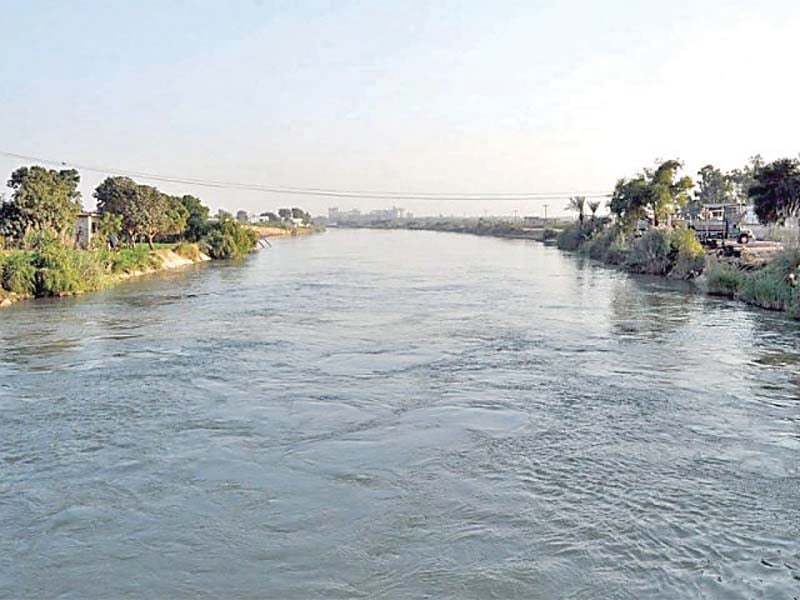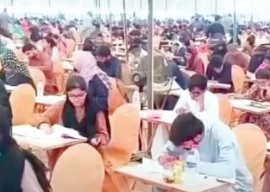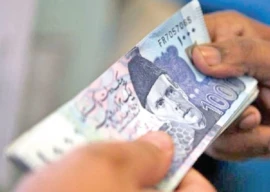
On Friday the Supreme Court's (SC) judicial commission on water and sanitation inspected the treatment plant and sites from where poisonous liquids are being released into the KB Feeder Canal. The visit laid bare the inferior toxicity treatment system being practised at the plant, built at a cost of over Rs1 billion on a order given by the Sindh High Court (SHC) in 2010.
It is the same canal which will supply water for the Rs51 billion K-IV project, which was inaugurated in August, 2016, and aims to supply 260 million gallons of water to Karachi per day.
The Justice Muhammad Iqbal Kalhoro, who heads the commission, to the plant's private operators elicited vague answers. "You are misleading the commission. Be honest," said Hyderabad commissioner Qazi Shahid Pervez to Syed Faisal, a chemical analyst at the plant, when his replies about sudden stoppage of waste water's discharge in the canal from the plant failed to convince the officials. The move was considered to be an act of hiding the scale of pollution.

Water expert Dr Ahsan Siddiqui, whom the SHC has given responsibility of monitoring the water quality of Manchar and Keenjhar lakes daily, pointed out that the plant is devoid of a water testing laboratory. The operator reluctantly admitted that the private operator's lab was located in Karachi.
"The quality check of treated water being released into the canal has to be carried out after every four to five hours," said Sindh Environment and Protection Agency (SEPA) director-general Naeem Ahmed Mughal.
Dr Siddiqui also explained that the plant is failing to carry out chemical oxidation and biological oxidation demand processes, which are quintessential for toxicity treatment. "They are throwing poisonous water into the canal which has become a health and environmental hazard for the people of Jamshoro, Thatta and Karachi as well as Keenjhar Lake."
Mughal said the agency has checked noncompliance of the standards. Pervez and Jamshoro deputy commissioner Munawar Ali Mahesar also informed the commission of having repeatedly told the private operator to address the problem but to no avail.
Advocate Amjad Sehto showed the judge the electricity bill of the plant for December, 2016, which was only Rs32,000. "This makes it evident that they are not actually running the plant."
The commission also visited the point from where a tuberculosis centre's and municipal waste is being discharged into the canal. The Kotri taluka's 2.7 MGD water filtration plant also appeared dysfunctional as the municipal official admitted their failure and capacity to maintain the plant. The official agreed to a suggestion that the public health engineering department, which built the facility and handed it over to the municipality, should be given the responsibility of maintaining it.
Hyderabad
The commission ordered Liaquat University's hospitals in Hyderabad and Jamshoro to adopt hospital waste management standards recommended by SEPA and to complete the process for constructing incinerators. During a hearing at the SHC's circuit bench in Hyderabad, the commission received complaints of rampant garbage dumping and burning in the populated areas.
The commissioner also informed the judge that Qasimabad Municipal Committee (QMC) was overstaffed with around 300 unnecessary clerical and supervisory staff. It was also disclosed that 18 Muslims are appointed among 209 sanitary workers but they perform duties of computer operator and drivers. Local government minister Jam Khan Shoro, whose younger brother Kashif Shoro is chairperson of the QMC, was blamed for such appointments.
"This is a criminal drain of financial resources," said Pervez, who fired hundreds of contractual staff of Hyderabad Development Authority in June.
Published in The Express Tribune, January 21st, 2017.
1725612926-0/Tribune-Pic-(8)1725612926-0-405x300.webp)




1732176172-0/Untitled-design-(8)1732176172-0-270x192.webp)
1732175528-2/Untitled-design-(5)1732175528-2-270x192.webp)










COMMENTS
Comments are moderated and generally will be posted if they are on-topic and not abusive.
For more information, please see our Comments FAQ